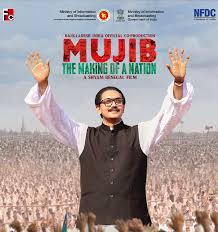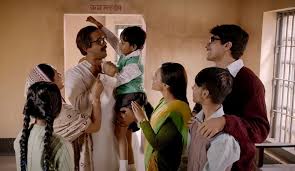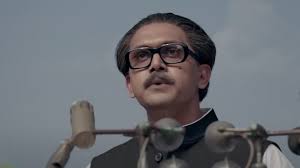|
|
||
|
Pro Tools
FILMFESTIVALS | 24/7 world wide coverageWelcome ! Enjoy the best of both worlds: Film & Festival News, exploring the best of the film festivals community. Launched in 1995, relentlessly connecting films to festivals, documenting and promoting festivals worldwide. We are currently working actively to upgrade this platform, sorry for the inconvenience. For collaboration, editorial contributions, or publicity, please send us an email here. User login |
Siraj SyedSiraj Syed is the India Correspondent for FilmFestivals.com and a member of FIPRESCI, the International Federation of Film Critics. He is a Film Festival Correspondent since 1976, Film-critic since 1969 and a Feature-writer since 1970. He is also an acting and dialogue coach. @SirajHSyed  Mujib-The Making of a Nation, Review: How to fit three decades in three hours
Mujib-The Making of a Nation, Review: How to fit three decades in three hours Sheikh Mujib-ur-Rehman, the tall, towering personality who was the single most important leader of East Pakistan, and largely responsible for the creation of BanglaDesh, served as President of his free country during 25 January 1975-15 August 1975, a period of only eight months. In an unfortunate co-incidence, he died on the Independence Day of India. Indian producer-director-actor I.S. Johar made a film called Joi Bangla Desh, in 1971, a crude satire on a major chapter of Asian history. While in BanglaDesh, serving on the Jury of the Dhaka International Film Festival, I had occasion to see a BanglaDeshi film, made on the country’s freedom struggle. It was bursting with sentiment, but fell short on film-making standards. And now we have an official BanglaDesh-India co-production, Mujib, The Making of a Nation, directed by Shyam Benegal, who turns 89 this December. Though not among his best, it must be seen, as a creative lesson in history.
As a biopic, it shows vignettes from Mujib’s life, right from his youth, in his native village of Tungipara, till his assassination. The agitation begins when Mujib raises the issue of language. Urdu was thrust down BanglaDeshis’ throats by the masters, who sat in West Pakistan. Mujib wanted Bangla (Bengali) to be on par with Urdu. As the resistance to his demand grew, he proposed a federation of West Pakistan and East Pakistan, with their own currency and flags, with International Relations and a few other government functions to be performed jointly. This enraged the powers that be. Mujib was imprisoned, though he had to be released, in view of public revolt. He then came out with a six-point plan, and vowed to continue the agitation till his demands were met. When elections were held, Mujib’s Awami League party won 167 seats out of 169, and became the single largest party in Pakistan. As Zulfikar Ali Bhutto’s party had done well in West Pakistan, the two met in Dhaka, to come to an understanding. But even Bhutto refused to grant Mujib’s wishes, calling him a mad man. Meanwhile, Ayub Khan had put him in jail on an imaginary conspiracy case. Mujib used to smoke cigarettes. But one of his mentors gifted him a pipe, extolling the virtues of smoking an elegant pipe over the humble cigarette. That is why, most of his pictures show him smoking a pipe. His family stood rock solid behind him, although he used to be away for days, weeks and even months on end. He got his daughter Hasina married to man named M.A. Wazed Miah, and so she became Sheikh Hasina Wazed. Awami League members and supporters fought the heavily armed West Pakistani soldiers tooth and nail. Thousands died. With Indian support, thanks to a stand taken by the then Prime Minister, Indira Gandhi, East Pakistan fought troops of General Yahya Khan, separated from Pakistan, and became an independent nation, in 1971. Over one crore refugees, who had crossed over to India during the struggle, returned. Bangabandhu (Bengal’s brother) Sheikh Mujibur Rehman, president of Bangladesh (in absentia from 26 March 1971 to 11 January 1972), Prime Minister of Bangladesh (1972-24 January1975), president of Bangladesh (25 January 1975-15 August 1975), lived for less than four years after its Independence Day, 26 March 1971. He and his family were assassinated by the military. Two of his daughters, who were abroad at that time, survived. Of them, Shaikh Hasina Wazed returned to serve as prime minister of Bangladesh (1996–2001; 2009– ). Writers Shama Zaidi and Atul Tiwari, who have collaborated earlier, return to the Shyam Benegal fold. This time around, they have had to contend with a more recent chapter of history, with most records available. That is both, a blessing in disguise and a dilemma. There is so much to choose from, and what portions should you leave out? Should the beginning of the reign of Sheikh Hasina Wazed have been appended? Should the identity of the assassins have been made known? Should India’s role in the movement have been given prominence? As it is, we see only one real scene of an Indian army officer in BanglaDesh. It must have been an eye-opener for some viewers to discover that two BanglaDeshis had a big hand in proposing the formation of Pakistan. We saw the Hindi version, with almost the entire dialogue in Hindi, but for token lines in Bangla (Bengali). Perhaps it would have been a better idea to retain the original dialogue in Bangla and show us a sub-titled version. It just does not ring true when large passages of dialogue are delivered in Hindustani. Having delivered some appealing biopics (The Making of the Mahatma, and Netaji Subhashchandra Bose), Shyam Benegal stutters this time. But one is obliged to give him some leeway on account of his age. His oeuvre lists 21 feature films, and around the same number of documentaries. After the TV outing, Samvidhan (Constitution, 2014), this is the first film he has helmed in nine years. It must be his credentials that got him this assignment. That both BanglaDesh and India have put faith in his well-heeled abilities, is itself testimony to the fact he is among the finest directors in this part of Asia. One only wonders whether the film would have had greater impact had a well-known face played Sheikh Mujib-ur Rehman. But then, hardly any BanglaDeshis would have a following in India, and you cannot escape the fact that a BanglaDeshi had to play the title role, so the case rests. Since at least two generations must be aware of the general acts, of and about Mujib, those are all there. The BanglaDesh archives must have opened their doors. But the detailing is competent, and kudos to Shama Zaidi and Atul Tiwari. Benegal inserts several scenes to show that Mujib was a compassionate, loving family man. There are some scenes of battle, but they never overwhelm the narrative. India’s major role in the liberation of BanglaDesh, is underplayed, if anything. But the tour de force is the appearance of Mrs. Indira Gandhi, the then Prime Minister of India, in an excerpt from a TV interview conducted by a fair-skinned man. She summarises the issue in a hard-nosed byte. Co-incidentally, she was again shown talking to a white man on TV, in the film Indi(r)a Emergency.
Chosen to play Mujib is Arifin Shuvoo, a multi-talented actor: radio personality, television presenter, playback singer and model. He is now 41. A long process of auditioning and short-listing was undertaken before Arifin was offered the role. It must have been a daunting task, playing BangaBandhu. At times, he seems to struggle, but overall, he is a good choice. Of the humungous cast, it is difficult to remember names and comment about each member. The only face I recognised was that of Rajit Kapoor, as Zulfikar Ali Bhutto. He does not have much of a role and his meeting with Mujib has been poorly filmed. Cinematography Akashdeep Pandey is found wanting in some places, mainly due to lighting. Music by Bengali Shantanu Moitra is as appealing as ever, with minmum songs, as it should be. Editing is by veteran Aseem Sinha, who must have had the herculean task of sticking to the dozens of events in Mujib’s life, and keeping a check on the overall duration of the film. 178 minutes is a bit too long, and viewer interst sags in the second half. Making of a nation has little by way of entertainment or relief, and these factors are not missed in such a heavy and political plot. Not recommended for the average cinegoer, Mujib is a historical document, made sincerely. If you care about South Asian politics in general, and BanglaDesh in particular, and are prepared to sit and watch for three hours, this is definitely your cup of tea. Fitting three decades in three hours is an achievement in itself. Rating: ** ½ Trailer: https://youtu.be/zN8QaNfCbPs 31.10.2023 | Siraj Syed's blog Cat. : Akashdeep Pandey Arifin Shuvoo Aseem Sinha Atul Tiwari bangladesh East Pakistan I.S. Johar Shama Zaidi Shantanu Moitra Sheikh Mujib-ur-Rehman Shyam Benegal
|
LinksThe Bulletin Board > The Bulletin Board Blog Following News Interview with EFM (Berlin) Director
Interview with IFTA Chairman (AFM)
Interview with Cannes Marche du Film Director
Filmfestivals.com dailies live coverage from > Live from India
Useful links for the indies: > Big files transfer
+ SUBSCRIBE to the weekly Newsletter DealsUser imagesAbout Siraj Syed Syed Siraj Syed Siraj (Siraj Associates) Siraj Syed is a film-critic since 1970 and a Former President of the Freelance Film Journalists' Combine of India.He is the India Correspondent of FilmFestivals.com and a member of FIPRESCI, the international Federation of Film Critics, Munich, GermanySiraj Syed has contributed over 1,015 articles on cinema, international film festivals, conventions, exhibitions, etc., most recently, at IFFI (Goa), MIFF (Mumbai), MFF/MAMI (Mumbai) and CommunicAsia (Singapore). He often edits film festival daily bulletins.He is also an actor and a dubbing artiste. Further, he has been teaching media, acting and dubbing at over 30 institutes in India and Singapore, since 1984.View my profile Send me a message The EditorUser contributions |





























